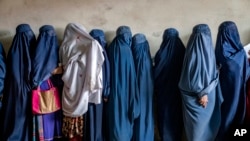Members of the United Nations Security Council, except Russia and China, on Tuesday issued a resounding condemnation of the Taliban’s relentless persecution of women in Afghanistan, calling on all member states to take urgent action to hold the country’s leadership accountable.
The U.N. Secretary-General’s Special Representative for Afghanistan, Roza Otunbayeva, said since seizing power in 2021, the Taliban have issued over 50 decrees with the explicit aim of erasing women from public life.
The decrees have included the closure of secondary education for women, including universities, the prohibition of women's entry into entertainment and sports facilities, the total exclusion of women from government, and the denial of most jobs for women.
Sima Bahous, executive director of U.N. Women, told the same meeting that the Islamist government has imposed extreme patriarchal gender norms that flagrantly deny women their basic human rights.
Afghan women “tell us that they are prisoners living in darkness, confined to their homes without hope for the future,” said Bahous.
Karima Bennoune, an international human rights expert, urged the United Nations to officially recognize and codify the gender apartheid system that has taken hold in Afghanistan.
“A powerful aspect of the gender apartheid approach is that [it] not only implicates the perpetrators of apartheid, but it means, as was the case with racial apartheid in South Africa, that no member state can be complicit in or normalize the Taliban’s illegal actions and that they must take effective action to end this situation,” Bennoune told the Security Council meeting.
Codifying gender apartheid in international laws, Bennoune said, would make it clear that there can be no recognition of the Taliban government by any member state, and that the country should not be granted a seat at the U.N.
Hundreds of Afghan women who participated in a U.N. survey in July voiced a similar sentiment, saying that any recognition of the Taliban government should be contingent on concrete improvements in women's rights, including access to education and the ability to work.
Despite the Taliban's ban on Afghan women working for U.N. agencies and nongovernmental organizations, Special Representative Otunbayeva emphasized the importance of continuing diplomatic engagement with the Taliban.
“Dialogue is not recognition,” she said. “Engagement is not acceptance of these policies. On the contrary: dialogue and engagement are how we are attempting to change these policies.”
No Condemnation by Russia, China
Calling the Taliban’s policies abhorrent and unacceptable, nearly all council members, except for Russia and China, demanded that Taliban leaders end their misogynistic policies.
In her remarks to council members, Anna Evstigneeva, deputy Russian representative to the U.N., said that “we closely listened” to the statements made by the head of U.N. Women and Bennoune, but she did not condemn the Taliban policies.
Instead, she used the platform to criticize the United States and NATO for their two-decade-long war in Afghanistan and their subsequent abandonment of the country, leaving it mired in humanitarian crises.
“We are keen to develop relations with Kabul,” said Evstigneeva, adding that a Taliban delegation, along with representatives from Indonesia, Turkey and several regional countries, have been invited to a meeting about Afghanistan in Kazan, Russia, on Friday.
A Chinese representative went as far as to urge Taliban authorities to respect the rights of Afghan women and form an inclusive government.
China recently appointed a new ambassador to Kabul.
Chinese companies have also signed mining contracts with the Taliban government.






